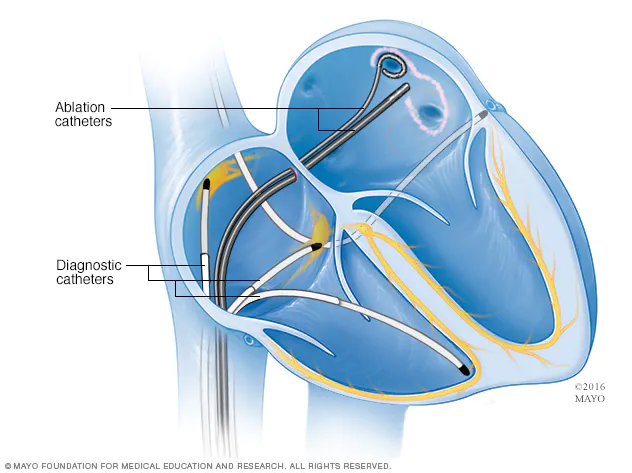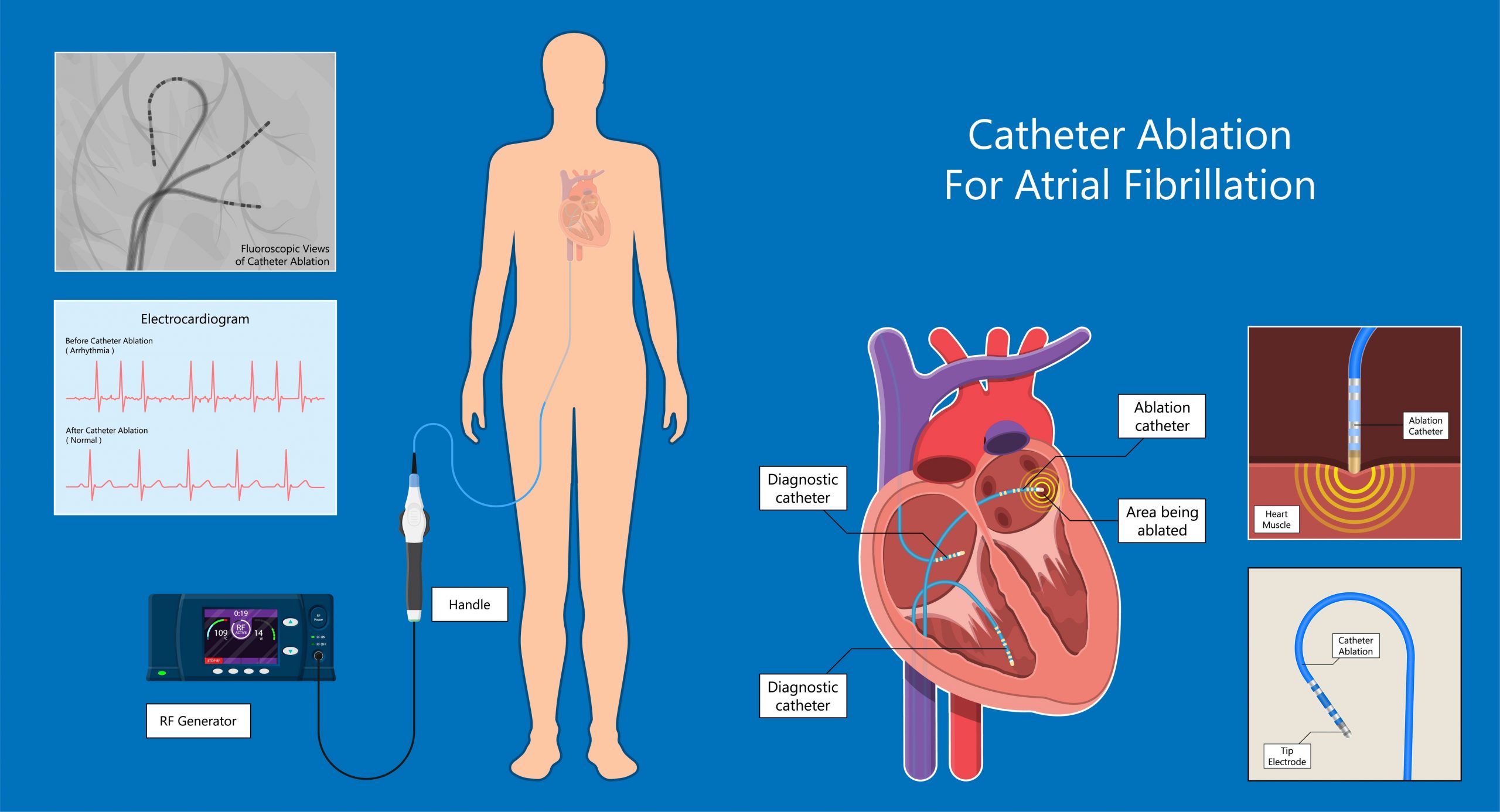Cardiac ablation is a medical procedure that has become increasingly common in the treatment of various heart rhythm disorders. It involves the use of specialized techniques to selectively destroy or modify the abnormal tissue causing the irregular heart rhythm. This article aims to provide a comprehensive understanding of What does ablation do to your heart, exploring its impact on the cardiovascular system and discussing the potential benefits it offers.
The Purpose of Cardiac Ablation:
Cardiac ablation is primarily performed to treat abnormal heart rhythms, known as arrhythmias. It targets specific areas in the heart that are responsible for generating or conducting irregular electrical signals. By destroying or modifying these areas, ablation aims to restore a normal heart rhythm and improve overall cardiac function.
How Ablation Works:
During the ablation procedure, a cardiologist or electrophysiologist inserts catheters into blood vessels and guides them to the heart. These catheters deliver various forms of energy, such as radiofrequency, cryotherapy, or laser, to the targeted tissue. The energy destroys or scars the abnormal tissue, disrupting the faulty electrical pathways and restoring a normal heart rhythm.
Types of Arrhythmias Treated with Ablation:
Cardiac ablation is commonly used to treat several types of arrhythmias, including atrial fibrillation, atrial flutter, supraventricular tachycardia, and ventricular tachycardia. The specific approach and techniques used may vary depending on the type and location of the arrhythmia.

Impact on Heart Function:
The primary goal of cardiac ablation is to restore normal heart rhythm and improve overall heart function. what does ablation do to your heart By eliminating or modifying the abnormal tissue responsible for the arrhythmia, ablation helps the heart pump blood more efficiently, reducing symptoms such as palpitations, shortness of breath, and fatigue.
Potential Benefits of Cardiac Ablation:
a. Symptom Relief: A successful ablation procedure can significantly reduce or eliminate symptoms associated with arrhythmias, improving the quality of life for affected individuals.
b. Medication Reduction: For some patients, ablation may allow a reduction in the need for long-term medications used to manage heart rhythm disorders.
c. Stroke Prevention: In cases of atrial fibrillation, ablation can help lower the risk of stroke by restoring a more regular heartbeat and reducing the dependence on blood-thinning medications.
d. Avoiding Complications: By treating arrhythmias, ablation may help prevent potential complications, such as heart failure, blood clots, and cardiac arrest.
Considerations and Potential Risks:
While cardiac ablation is generally considered safe and effective, it is essential to discuss potential risks and complications with your healthcare provider. These may include bleeding, infection, damage to blood vessels, heart valve damage, or the need for additional procedures.
Post-Ablation Recovery and Follow-up:
Following the ablation procedure, a period of recovery and monitoring is typically necessary. Your healthcare team will provide instructions on post-procedure care, medication management, and follow-up visits to assess the success of the procedure and address any concerns.
Collaboration with Healthcare Professionals:
Successful ablation outcomes rely on the expertise and collaboration of a multidisciplinary team, including cardiologists, electrophysiologists, and specialized cardiac nurses. what does ablation do to your heart -It is important to work closely with your healthcare professionals to ensure the best possible treatment and ongoing care.
Effectiveness and Success Rates:
Cardiac ablation has shown promising results in treating various arrhythmias. Studies have demonstrated high success rates in restoring normal heart rhythm, with many patients experiencing long-term symptom relief and improved quality of life. Your healthcare provider can discuss the expected effectiveness and success rates specific to your condition.
Preparing for Cardiac Ablation:
Before undergoing cardiac ablation, thorough preparation is necessary. This typically involves a comprehensive evaluation of your heart health, including diagnostic tests such as an electrocardiogram (ECG), echocardiogram, and possibly a cardiac MRI. Your healthcare team will provide specific instructions on medication management, fasting requirements, and any lifestyle modifications leading up to the procedure.
Alternative Treatments:
While cardiac ablation is an effective treatment option for many heart rhythm disorders, it may not be suitable for everyone. Depending on the specific arrhythmia and individual circumstances, alternative treatments such as medication therapy, implantable devices like pacemakers or defibrillators, or surgical interventions may be considered. Your healthcare provider will guide you in determining the most appropriate treatment plan.

Long-Term Monitoring and Follow-Up Care:
Following a successful ablation procedure, long-term monitoring and follow-up care are essential. Your healthcare team will schedule regular check-ups to evaluate your heart rhythm, assess the effectiveness of the procedure, and make any necessary adjustments to your treatment plan. It is important to attend these follow-up appointments to ensure optimal heart health and ongoing management of your condition.
Lifestyle Modifications:
In addition to the ablation procedure itself, your healthcare provider may recommend certain lifestyle modifications to support the success of the treatment. This may include adopting a heart-healthy diet, engaging in regular exercise, managing stress levels, and avoiding triggers that can contribute to heart rhythm disturbances.
Ongoing Education and Support:
Living with a heart rhythm disorder can be challenging, and it is important to seek ongoing education and support. Participating in cardiac rehabilitation programs, joining support groups, or connecting with online communities can provide valuable information, resources, and emotional support to help you navigate your journey toward heart health.
Advancements in Cardiac Ablation Techniques:
The field of cardiac ablation continues to evolve, with ongoing advancements in techniques and technology. What does ablation do to your heart – Newer approaches, such as cryoablation and robotic-assisted procedures, offer potential benefits in terms of precision, safety, and patient outcomes. Staying informed about these advancements can help you make informed decisions regarding your treatment options.
In conclusion, cardiac ablation is a valuable medical procedure that targets and treats abnormal heart rhythms. By understanding what ablation does to your heart, you can gain insights into its impact and potential benefits. If you are experiencing symptoms of an arrhythmia or have been diagnosed with a heart rhythm disorder, consult with your healthcare provider to determine if cardiac ablation is an appropriate treatment option for you.
















